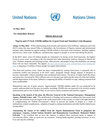Click to expand Image
Pro-democracy protesters during a mourning ceremony for Netiporn “Bung” Sanesangkhom, a Thai political activist, outside the Southern Bangkok Criminal Court on May 14, 2024.
© 2024 Peerapon Boonyakiat/SOPA Image/Sipa USA via AP Photo
Thai anti-monarchy activist Netiporn “Bung” Sanesangkhom, 28, died in custody in Bangkok today while on a hunger strike she began in January.
Netiporn brought attention to Thailand’s cruel use of its lese majeste (insulting the monarchy) law, which punishes critics of the monarchy with up to 15 years in prison. Thai authorities had paused lese majeste prosecutions for nearly three years until November 2020, when then-Prime Minister Gen. Prayut Chan-ocha ordered prosecutions resumed, purportedly due to growing criticism of the monarchy.
Authorities have jailed thousands under this law in recent years, and hundreds have been sentenced to lengthy prison terms. Hundreds of people accused of criticizing the monarchy are currently in pretrial detention without access to bail.
Thailand’s current prime minister, Srettha Tavisin, has vowed to continue strict enforcement of the lese majeste law. The Constitutional Court in January ruled that attempts by the opposition Move Forward Party to amend the law would amount to treason, which could result in the party’s dissolution and a ban on its leaders from politics.
Netiporn was one of about 270 activists charged with lese majeste after pro-democracy demonstrations broke out in Thailand in 2020. Her alleged crimes were related to a peaceful campaign to survey inconveniences to the Thai public from royal motorcades.
Human Rights Watch and several United Nations human rights experts, including the Office of the High Commissioner for Human Rights and the Working Group on Arbitrary Detention, have repeatedly voiced concern over the Thai government’s use of arbitrary arrest and pretrial detention to punish critics of the monarchy.
Netiporn began her hunger strike to demand the right to bail for detainees like herself and to protest such prosecutions in general. Authorities met her demands with silence and have shown no interest in reforming the law or leniency for critics.
Prime Minister Srettha has now been in office 10 months, saying he would strengthen the rule of law and make Thailand a more rights-respecting country. But repressive government prosecutions remain the norm, reminiscent of when Thailand was under military rule.
Netiporn’s death should be a catalyst for Thai government reform. Authorities should engage with UN experts and civil society groups to amend the lese majeste law and bring it into compliance with human rights standards. The Thai government should permit all peaceful expression of political views, including issues about the monarchy.



